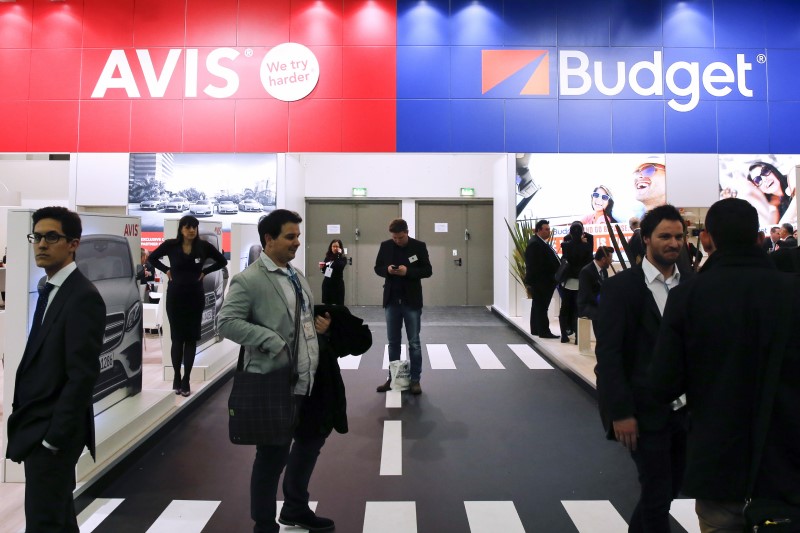One & One Green Technologies stock soars 100% after IPO debut
On Friday, JPMorgan analyst Ryan Brinkman increased the price target for Avis Budget Group (NASDAQ:CAR) shares to $155 from $145, while reiterating an Overweight rating. According to InvestingPro data, this new target represents the highest among analyst forecasts, which range from $95 to $145, suggesting significant upside potential from the current price of $101.09. Brinkman’s decision followed Avis Budget’s first-quarter earnings report, which revealed lower revenue but a notably better EBITDA than expected. Despite a revenue decline of 2.78% over the last twelve months to $11.67 billion, as reported by InvestingPro, the company’s EBITDA outperformed JPMorgan’s estimate of negative $125 million and the Bloomberg consensus of negative $120 million, recording negative $93 million instead. InvestingPro analysis reveals 13 additional key insights about CAR’s performance and outlook, available to subscribers. This outperformance was attributed to favorable vehicle depreciation trends, with monthly Depreciation per Unit (DPU) tracking significantly below projections and the company’s own guidance.
The improved EBITDA was partly due to Avis’s accelerated fleet rotation initiatives that began in the fourth quarter of 2024 and continued into the first quarter of 2025. On Thursday, Avis Budget shares experienced a modest increase of 0.6%, which aligned with the S&P 500’s gain of 0.58%. However, during the day, the stock had dropped as much as 10.4%, likely as a result of investor reactions to the company’s second-quarter EBITDA guidance, which was lower than the consensus estimate of $251 million and did not include specific guidance for full-year EBITDA.
In response to the second-quarter guidance, Brinkman noted that Avis traditionally provides a guidance range with an open-ended upside. Consequently, JPMorgan’s own forecast for second-quarter EBITDA was adjusted from $281 million to $270 million, still surpassing the consensus estimate. Management clarified during a follow-up call that their guidance does not factor in significant potential tariff-induced inflation in new vehicle prices, which could benefit used vehicle residual values—a possibility partially anticipated by investors.
Avis Budget reiterated its goal to generate normalized annual EBITDA of at least $1 billion, with an expected free cash flow conversion of approximately $350 to $400 million from this level of EBITDA. While management expressed confidence in achieving the $1 billion EBITDA target in 2025, they refrained from providing explicit guidance during the earnings call, citing the heightened macroeconomic uncertainty in the second half of 2025 that has led several companies, including Ford and parts suppliers Aptiv (NYSE:APTV), Lear (NYSE:LEA), and Visteon (NASDAQ:VC), to suspend formal financial guidance. InvestingPro’s comprehensive analysis shows the company currently maintains a ’Fair’ overall financial health score of 2.37, with particularly strong ratings in price momentum and relative value metrics. For detailed insights into CAR’s valuation and future prospects, investors can access the full Pro Research Report, available exclusively to subscribers.
In other recent news, Avis Budget Group reported disappointing financial results for the first quarter of 2025, with earnings per share (EPS) significantly below expectations at -$14.35, compared to a forecast of -$5.34. The company’s revenue also declined to $2.4 billion from $2.5 billion in the same quarter the previous year. Despite this setback, Avis Budget remains optimistic about future performance, targeting an annual adjusted EBITDA of at least $1 billion and expecting Q2 adjusted EBITDA to exceed $200 million. In another development, Jefferies analyst Stephanie Moore raised the price target for Avis Budget shares to $117 from $107, maintaining a Buy rating. Moore’s positive outlook was influenced by the company’s strategic fleet updates and effective management, which have resulted in cost savings. Additionally, Avis Budget is focused on reducing per unit fleet costs to $300 by the fourth quarter of 2025, while also planning for CEO Joe Ferraro’s retirement at the end of June. These developments reflect Avis Budget’s ongoing efforts to navigate industry challenges and improve financial performance.
This article was generated with the support of AI and reviewed by an editor. For more information see our T&C.
